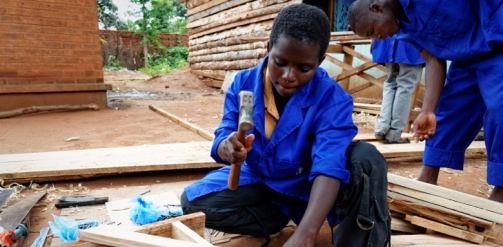At a university coffee shop in Lagos, Nigeria, a researcher is interviewing a recent graduate about her first formal job. For the last six months, she has worked as a customer service representative in a call centre run by a multi-national telecoms company. She has a temporary, nine-month contract.

He asks: “So, how is the job?”
She reflects for a moment before responding flatly: “It’s decent.”
The researcher is pressed for time, and anxious to get to the next interview. He scribbles “It’s decent” across the page on his clipboard, and makes a mental note to think more about what this might mean. He moves on to the next question.
Later, reflecting on the day, the researcher just can’t get that phrase out of his head – “It’s decent”. He identifies two possible meanings. The first associates decent with notions like OK, not bad, or better than nothing. The second with notions like respectable, appropriate, or satisfying general standards of propriety or good taste.
What is decent work?
The vignette above points to a dilemma faced by policymakers throughout Africa. Is any work, no matter what the terms and conditions, better than no work at all?
The International Labour Organization (ILO) has developed and promoted the idea of “decent work” over nearly two decades. And these efforts have paid off – the pillars and elements of the Decent Work Agenda are fully integrated into the Sustainable Development Goals. In the World Report on Child Labour 2015: Paving the Way to Decent work for Young People, the ILO describe decent work as productive work that, in addition, delivers:
“A fair income, security in the workplace and social protection for families, better prospects for personal development and social integration, freedom for people to express their concerns, organise and participate in the decisions that affect their lives and equality of opportunity and treatment for all women and men”.
This is closer to the second meaning identified by the researcher than it is to the first. While we might assume that decent work should represent a floor below which no jobs fall, for many millions of workers, including increasing numbers in post-industrial countries, decent work appears increasingly unattainable. Indeed, many jobs would struggle to meet even one of the ILO’s criteria, to say nothing of the whole package.
In 2004, Marilee Grindle introduced the idea of ‘good enough governance‘. The argument was that not all governance deficits need to be – or can be – tackled at once, and that attention should therefore be directed to “the minimal conditions of governance necessary to allow political and economic development to occur”.
Along similar lines, is it time to be pragmatic and shift the practical discussion from decent work to “decent enough work”? It is after all a big, complex agenda, and like good governance, it has proven difficult to tackle.
So, ask yourself, what would be the minimal conditions of work necessary to allow economic security, advancement and dignity? Must the work be productive? Provide a fair income? Or workplace security? Social protection? Prospects for personal development and social integration? Freedom to express concerns, organise and participate in decisions? Or equality of opportunity and treatment?
What is the minimum that you would find acceptable? And, what should others – the unemployed, the poor or young people – be willing, or required, to accept?
Whose definition of “decent enough” counts?
The reality of formal labour markets in Africa
Our recent work on young people’s engagement with formal labour markets in Africa supports other research that suggests that many of the formal sector jobs that young people have fall well short of the standard of decent work – even where attaining such a job is considered a success. There is little job security; labour regulations are flouted; and there are few viable avenues for recourse if workers’ rights are not respected or obligations not met. In other words, even for those lucky enough to get a formal or salaried job, they are not guaranteed an escape from work-place insecurity or exploitation.
This situation partly arises because existing national labour laws and regulations are not enforced consistently, but it also reflects two important imbalances. The first is the imbalance between the formal and informal sectors, and the second is the imbalance between demand and supply in the labour market, where the number of job seekers dwarfs the number of available jobs. These imbalances create opportunities, and strong incentives and disincentives for employers; and in many cases their responses, while good for business in the short-term, undermine the principles of decent work.
Of course, the challenge is to create or stimulate the creation of as many decent work opportunities as possible. But the issues facing both new labour market entrants in Africa, and policy makers, go well beyond the immediate jobs gap. In the post-industrial economies of the North, on-going changes in the nature of work, the workplace, and worker–employee relationships are receiving much public, policy, judicial and academic attention. Flexible working, distance working, casualisation, zero hours contracts, the rapidly growing gig economy, and robots are some of the concerns around which current debates turn.
Many of these same developments are already seen in African labour markets, and the present trajectory would suggest they will only become more pervasive.
The relevance and power of notions like good job and decent work hang in the balance. The danger of complacency is that the language and mentality of “good enough jobs” and “decent enough work” becomes normalised. Decent enough jobs may be good enough for now, but only as a stepping stone to real decent jobs, just as “good enough” governance implies necessary, short-term improvisations on the way to something substantively better.
—
This blog reflects inputs from Amalavoyal Chari, Justin Flynn, Philip Mader, Grace Mwaura, Marjoke Oosterom, Robert Sam-Kpakra, Ayodele Ibrahim Shittu and James Sumberg.
Photo credit: ILO/Flickr – Pamela working as a carpenter in Malawi
